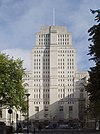The Institute of Cancer Research: Difference between revisions
Masonpatriot (talk | contribs) →External links: Added cat and fixes using AWB |
Added more details about the size of the organisation and also corrected the science about LOX |
||
| Line 3: | Line 3: | ||
'''The Institute of Cancer Research''' is a constituent college of the [[University of London]], [[England]]. |
'''The Institute of Cancer Research''' is a constituent college of the [[University of London]], [[England]]. |
||
It was founded in 1909 as a small research department of the [[Royal Marsden Hospital]], and currently occupies two sites, one in central London and one in Sutton. According to its vision statement, its aim is "...that people may live their lives free of the fear of cancer as a life-threatening disease...". |
It was founded in 1909 as a small research department of the [[Royal Marsden Hospital]], and currently occupies two sites, one in central London and one in Sutton. According to its vision statement, its aim is "...that people may live their lives free of the fear of cancer as a life-threatening disease...". Together with The Royal Marsden, it forms Europe's largest comprehensive cancer centre, and is internationally renowned for the quality of its science. |
||
== Activities == |
== Activities == |
||
| Line 14: | Line 14: | ||
Amongst its accomplishments are the discovery of the gene [[BRCA2]], which has been linked to [[breast cancer]], and of the anti-[[cancer]] [[medication|drug]]s [[carboplatin]] and [[tomudex]]. |
Amongst its accomplishments are the discovery of the gene [[BRCA2]], which has been linked to [[breast cancer]], and of the anti-[[cancer]] [[medication|drug]]s [[carboplatin]] and [[tomudex]]. |
||
In March 2009, the ICR announced that it had identified |
In March 2009, the ICR announced that it had identified a key enzyme responsible for the spread of cancer, which causes 90% of all cancer patient deaths. Research into the lysyl oxidase (LOX) enzyme is ongoing.<ref>http://www.icr.ac.uk/press/press_archive/press_releases_2009/10425.shtml</ref> |
||
== External links == |
== External links == |
||
| Line 36: | Line 36: | ||
[[no:Institute of Cancer Research]] |
[[no:Institute of Cancer Research]] |
||
References |
|||
<references/> |
|||
Revision as of 16:03, 15 September 2009
It has been suggested that Tacheback and Everyman Campaign be merged into this article. (Discuss) Proposed since July 2009. |
The Institute of Cancer Research is a constituent college of the University of London, England.
It was founded in 1909 as a small research department of the Royal Marsden Hospital, and currently occupies two sites, one in central London and one in Sutton. According to its vision statement, its aim is "...that people may live their lives free of the fear of cancer as a life-threatening disease...". Together with The Royal Marsden, it forms Europe's largest comprehensive cancer centre, and is internationally renowned for the quality of its science.
Activities
Its stated mission is:
- To conduct research into the causes, prevention, diagnosis and methods of cancer treatment. It does this by pursuing 3 main research themes: genetic epidemiology, molecular pathology, and therapeutic development.
- To provide education and advanced training for medical and scientific staff. As a college within the University of London, it provides postgraduate research degrees and taught degrees.
- To provide treatment and care for cancer patients. It does this via its partnership with the The Royal Marsden NHS Foundation Trust.
Accomplishments
Amongst its accomplishments are the discovery of the gene BRCA2, which has been linked to breast cancer, and of the anti-cancer drugs carboplatin and tomudex.
In March 2009, the ICR announced that it had identified a key enzyme responsible for the spread of cancer, which causes 90% of all cancer patient deaths. Research into the lysyl oxidase (LOX) enzyme is ongoing.[1]
External links
References

